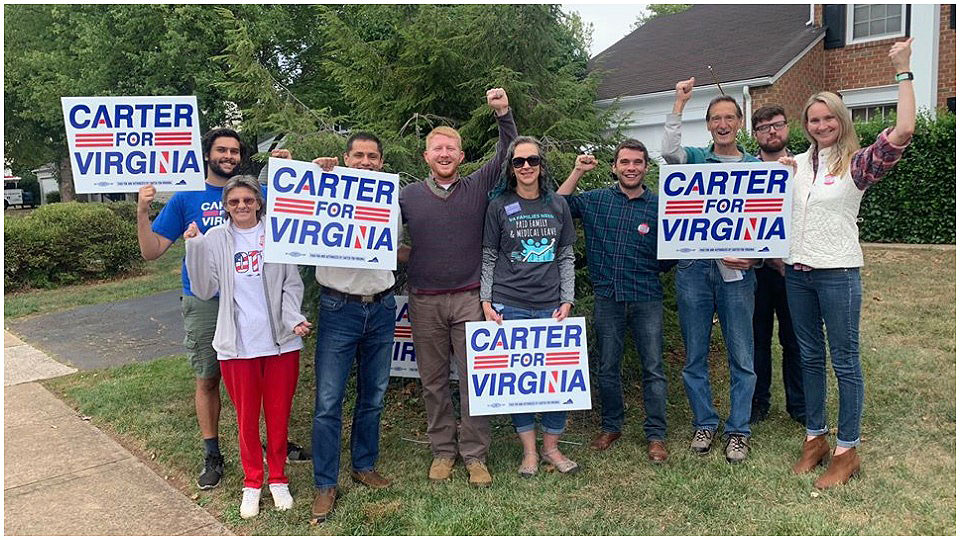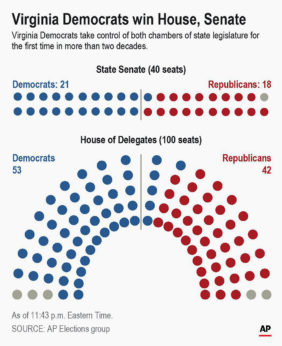
PRINCE WILLIAM COUNTY, Va.—On Tuesday, Nov. 5, there were many important victories for the Democratic Party, but none greater than in Virginia, where Democrats took control of both houses of the General Assembly (state legislature) for the first time in 26 years.
Republicans went into the election holding tiny majorities in the Senate and the House of Delegates, which is Virginia’s lower house. After big Democratic advances in the House election in 2017, the Republican majority was 51 to 49 Democrats in the 100-member House, and the ratio was 20 Republicans to 19 Democrats with one seat vacant in the 40-member Senate.
Barring changes resulting from any recounts, the new General Assembly which takes power in January will consist of 21 Democrats and 19 Republicans in the Senate, and 55 Democrats and 45 Republicans in the House of Delegates. The Democrats did not lose a single seat. Since the governor, lieutenant governor, and state attorney general are all Democrats, and can be expected to support many of the new General Assembly’s legislative initiatives, this is a huge victory for the Democratic Party.
And given that Virginia is a large state with 11 U.S. House Districts and 13 electoral votes in presidential elections, it is of great importance for the 2020 national elections as well—a thorough thumping for Trump and all he stands for.
The 2017 House election was a close call, with one seat in which only a single vote separated the Democrat and the Republican. This was decided by a coin toss, in favor of the Republican, securing the Republicans their slim majority. But this year that same seat was won by the same Democratic Party candidate, against the same Republican, by a comfortable margin: Democrat Shelly Simonds ousted incumbent Republican David Yancey, 58% to 40%, with two percent going to a Libertarian Party candidate.
The single declared socialist member of the House of Delegates, Lee Carter, who is a member of Democratic Socialists of America but ran on the Democratic Party line with support from the Bernie Sanders organization Our Revolution, was easily re-elected. This happened in spite of Republican scare tactics and red-baiting. Carter has played a leading role in the House of Delegates in working for repeal of Virginia’s “right to work” statute and has been a sharp critic of the state’s role in bringing the Amazon HQ2 project to Alexandria and Arlington in Northern Virginia, because of its likely impact on housing costs and transportation for working-class families.
This election continues the trend of electing more women, more African Americans, more Latin American people, Muslims, and immigrants into state government. Delegate Danica Roem, the first transgender woman to be elected to the House of Delegates, cruised to re-election on Tuesday by a margin of 57% to 43% over her Republican rival, in spite of an ugly transgender-baiting campaign organized by the Republicans at the state level.
In Northern Virginia, the Democrats took all legislative seats in the Washington, D.C., suburbs and exurbs. In addition, they won a large number of key local offices, such as county board chairs and memberships, school boards, sheriff’s offices, and state’s attorney’s offices.

Efforts by the Republican right to use the election to promote anti-immigrant and other divisive agendas fell flat in most places. In Prince William County in Northern Virginia, for example, the County Board of Supervisors has been headed for a number of years by far-right Republican Corey Stewart, famous for his role in the “Unite the Right” riot in Charlottesville in August 2017. Petulantly reacting to his failure to use his noxious immigrant bashing as a catapult to achieve national office, Stewart decided not to run for re-election to his county post.
Instead, the Republicans put forward his ideological twin, John S. Gray, who caused an uproar because of his bigoted comments in social media. On Tuesday, Gray was defeated by Democrat Ann B. Wheeler, 56% to 35%, with the difference going to two independent candidates. In sharp contrast to Stewart and Gray, Wheeler has promised that Prince William County will not cooperate with the Trump administration on immigration enforcement. The incoming Board of Supervisors will have a Democratic Party majority.
The new Prince William County Commonwealth Attorney, Amy Ashworth, who trounced her Republican rival Mike May 59% to 41%, will likely take progressive positions on social justice and criminal justice reform issues. Wheeler, in another sharp difference from Corey Stewart’s demagogic actions, has said that she will support changing the name of the Jefferson Davis Highway (U.S. Route 1) that runs through minority-majority areas of the county.
Throughout Virginia, the Democrats ran strongly in areas with large minority group concentrations and in college towns and other substantial urban areas, such as the state capital, Richmond. However, in rural areas and small towns with predominantly white populations, the Republicans still were able to hold off their Democratic challengers by large margins. Where the Democrats did well, it is clear that demographic changes played a major role, with increased minority populations, young people reaching voting age, and more people from other states moving into those areas. Voter suppression efforts and partisan, racial gerrymandering by the Republicans did not save their majorities this time.
The Democrats got strong endorsements from organized labor, from women’s, minority rights, and LGBTQ organizations, and from the environmental movement, as well as from gun control proponents. Democrats elected to the General Assembly in Northern Virginia tend to lean to the left within the ideological spectrum of the Democratic Party, but this is not necessarily true in other parts of the state. But the pressure to carry out real changes in this former Confederate state, original home to slavery in the United States, will be strong.
There will be pressure to raise the minimum wage and to improve access to health care for all Virginians. The ongoing efforts to restore the voting rights of former felons will increase sharply now that the Republicans will no longer be able to block them. In the outgoing General Assembly, efforts to sign Virginia onto the Equal Rights Amendment and to enact practical firearms controls were stymied by the Republican legislative leadership. These efforts will be strongly renewed. If the General Assembly endorses the ERA, it will have enough states on board to become part of the U.S. Constitution—a huge win for women’s rights. The environmental movement will find much more support in Richmond.
Redistricting of Congressional districts after the 2020 U.S. Census will take on a different aspect with a Democratic majority in power in Richmond that is more beholden to minorities and other previously underrepresented sectors.
A major objective of organized labor will be to get rid of the “right to work” statute, which is one factor that has kept labor union membership in the state extremely low. Virginia, the two Carolinas, and Utah—all “right to work” states—vie with each other for the dubious honor of having the lowest union membership percentages in the country. In Virginia in 2018, only 4.3% of wage and salaried workers belonged to a labor union, with only 5.5% covered by a union contract when one includes those who are not paying union dues. Business interests, the Republicans and some Democrats claim that “right to work” is part of the secret of Virginia’s attractiveness to outside investors (just as slavery used to be).
So changing this item will require a big mobilization, but the people’s forces have the wind in their sails.












Comments